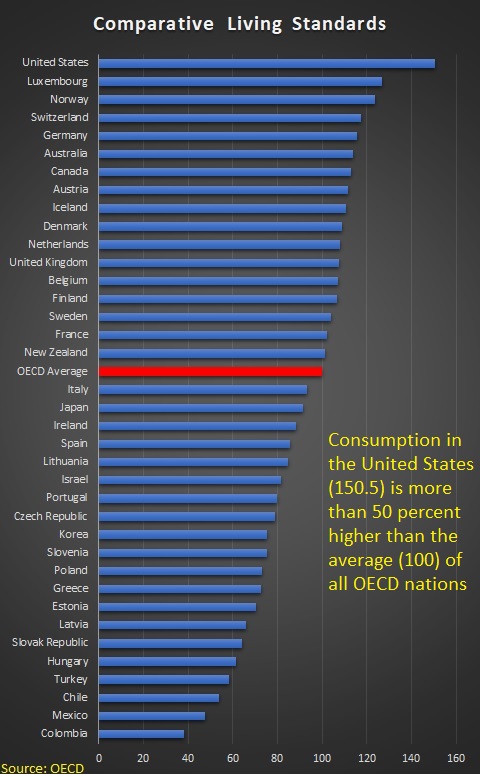I don’t know whether to be amused or frustrated, but I can’t help but notice that folks on the left frequently argue that the United States needs to make government bigger in order to “catch up” or “shrink the gap” with Europe.
President Biden even has said that America is “falling behind” because the fiscal burden of government is lower than it is in other nations.
My response is always to point out that there is a gap between the United States and other developed nations, but that gap always shows that people in America are more prosperous, with far higher levels of consumption.
Heck, lower-income people in the United States often are better off than middle-class people in Europe.
And what’s especially remarkable is that the gap is growing rather than shrinking, even though convergence theory tells us Europe should be growing faster.
So why should we want to copy the policies of nations that have lower living standards?
Yet none of this information was included in a New York Times article about paid parental leave by Claire Cain Miller. Instead, the focus of the article is how the United States “lags” behind other nations.
Congress is now considering four weeks of paid family and medical leave… If the plan becomes law, the United States will no longer be one of six countries in the world — and the only rich country — without any form of national paid leave. But it would still be an outlier. Of the 185 countries that offer paid leave for new mothers, only one, Eswatini (once called Swaziland), offers fewer than four weeks. …Globally, the average paid maternity leave is 29 weeks, and the average paid paternity leave is 16 weeks… Besides the United States, the only other countries with no paid maternity leave are the Marshall Islands, Micronesia, Nauru, Palau, Papua New Guinea, Suriname and Tonga.
The bottom line is that our government does not provide some of the goodies provided by politicians in other nations, but we have a much stronger economy that produces much higher living standards.
And there’s lots of evidence that there’s more prosperity in the United States precisely because the welfare state is smaller and the tax burden is not as onerous.
I’ll close by acknowledging that there is a very legitimate Arther Okun-style argument to accept weaker growth in exchange for more handouts from government.
In the case of parental leave, I don’t find that argument persuasive (for reasons explained here, here, here, here, and here), but reasonable people can disagree.
What’s not reasonable, however, is whining that the United States “lags” other nations without acknowledging Okun’s tradeoff.




